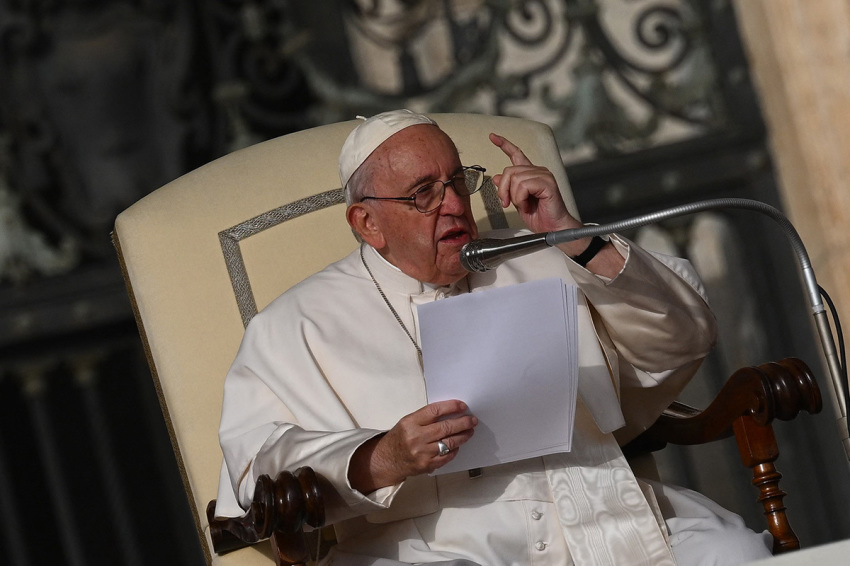Pope calls for universal ban on surrogacy: 'deplorable practice'

Pope Francis has received praise extending beyond Catholic circles after calling for a universal ban on surrogacy.
In remarks to members of the Diplomatic Corps Accredited to the Holy See on Monday, the pontiff declared that “the path to peace calls for respect for life, for every human life, starting with the life of the unborn child in the mother’s womb, which cannot be suppressed or turned into an object of trafficking.”
Francis transitioned into talking about surrogate motherhood, which is where a woman is artificially inseminated so she can carry a baby for nine months, only to be forced to surrender the child to a third party upon giving birth. Surrogate mothers are commonly used by same-sex male couples who desire to have biological children and heterosexual couples in which the woman struggles to conceive or carry a pregnancy to term.
Critics of the practice maintain that it amounts to abusing young women and replacing the marital act between husband and wife that results in the natural conception of children. “I deem deplorable the practice of so-called surrogate motherhood, which represents a grave violation of the dignity of the woman and the child, based on the exploitation of situations of the mother’s material needs,” Francis said.
“A child is always a gift and never the basis of a commercial contract. Consequently, I express my hope for an effort by the international community to prohibit this practice universally,” the pope added. Francis concluded his remarks on surrogacy by declaring, “At every moment of its existence, human life must be preserved and defended; yet I note with request, especially in the West, the continued spread of a culture of death, which in the name of a false compassion discards children, the elderly and the sick.”
Allie Beth Stuckey, host of the “Relatable” podcast, took to X Monday to praise the Pope for taking a stance against surrogacy: “As a reformed Protestant, I certainly don’t agree with the pope on much. But he is absolutely right about surrogacy. It is the commercialization of reproduction and the commoditization of bodies — a form of trafficking. The renting of wombs and the buying of babies must come to an end.”
The Catholic Church has long opposed the idea of surrogate motherhood. In a 1987 Instruction on Respect for Human Life in Its Origin and on the Dignity of Procreation authored by the Church’s Congregation for the Doctrine of the Faith that features “Replies to Certain Questions of the Day,” then-Cardinal Joseph Ratzinger elaborated on why the Catholic Church considers surrogacy a grave sin.
Eighteen years later, Ratzinger would become Pope Benedict XVI. “It is contrary to the unity of marriage and to the dignity of the procreation of the human person,” Ratzinger wrote.
“Surrogate motherhood represents an objective failure to meet the obligations of maternal love, of conjugal fidelity and of responsible motherhood: it offends the dignity and the right of the child to be conceived, carried in the womb, brought into the world and brought up by his own parents; it sets up, to the detriment of families, a division between the physical, psychological and moral elements which constitutes those families,” he continued.
Paragraph 2376 of the Catechism of the Catholic Church declares that “Techniques that entail the dissociation of husband and wife, by the intrusion of a person other than the couple (donation of sperm or ovum, surrogate uterus), are gravely immoral.”
According to the Catechism, “these techniques (heterologous artificial insemination and fertilization) infringe the child’s right to be born of a father and mother known to him and bound to each other by marriage. They betray the spouse’s ‘right to become a father and a mother only through each other.’”
Currently, the legal status of surrogacy varies around the world. Data compiled by the website Surrogacy 360 shows that several countries have completely banned the practice: Algeria, Azerbaijan, Austria, Bahrain, Bulgaria, Cambodia, China, El Salvador, Estonia, Finland, France, Germany, Hungary, Iceland, Indonesia, Italy, Kosovo, Kuwait, Lithuania, Malta, Moldova, Montenegro, Morocco, Nepal, Norway, Saudi Arabia, Serbia, Singapore, Slovakia, Slovenia, Spain, Sweden, Switzerland, Syria, Taiwan, Tunisia, Turkey and Turkmenistan.
In the United States, the legality of surrogacy varies by state.
States that explicitly permit some or all types of surrogacy include: California, Colorado, Connecticut, Delaware, Florida, Illinois, Iowa, Maine, Nevada, New Hampshire, New Jersey, New York, North Dakota, Ohio, Oklahoma, Rhode Island, Tennessee, Texas, Utah, Vermont, Virginia, Washington, Wisconsin and Wyoming.
The procedure is banned in Idaho, Indiana and Michigan, while Arizona, Arkansas, Louisiana and Massachusetts allow it in some circumstances.
Several other states do not directly regulate surrogacy: Alabama, Alaska, Georgia, Hawaii, Kansas, Kentucky, Maryland, Minnesota, Mississippi, Missouri, Montana, Nebraska, New Mexico, North Carolina, Oregon, Pennsylvania, South Carolina, South Dakota and West Virginia.
Ryan Foley is a reporter for The Christian Post. He can be reached at: ryan.foley@christianpost.com



























